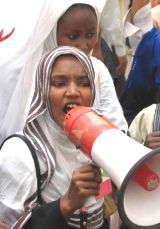Sudan’s Cabinet rejects UN resolution on ICC trials
By MOHAMED OSMAN, Associated Press Writer
KHARTOUM, Sudan, Apr 3, 2005 (AP) — The Sudanese government rejected Sunday a U.N. Security Council resolution that empowers the International Criminal Court to prosecute the alleged perpetrators of atrocities in the Darfur conflict.

|
|
Sudanese students shout using a public address system during a demonstration in the streets of the Sudanese capital of Khartoum April 2, 2005. (Reuters). |
A Cabinet meeting presided over by President Omar el-Bashir rejected Friday’s resolution and appointed a committee to work out “how to deal with this situation,” Acting Information Minister Abdel-Basit Sabdarat told state-run Radio Omdurman. El-Bashir will head the committee, he added.
While government officials and the ruling National Congress party had condemned the resolution, Sunday’s announcement was the first time that the government had given its view since the Security Council passed the resolution by 11-0 votes with four abstentions.
The western Sudanese region of Darfur has been the scene of what the United Nations has called the world’s worst humanitarian crisis. An estimated 180,000 people have died in the upheaval and about 2 million others have been displaced since the conflict began in February 2003.
The resolution was the first time that the Security Council had referred a case to the International Criminal Court, a tribunal that the United States opposes. The resolution was carefully worded to secure a U.S. abstention instead of veto.
U.N. Secretary-General Kofi Annan praised the passage of the resolution as lifting “the veil of impunity that has allowed human rights crimes in Darfur to continue unchecked.”
Sudan argues it is capable of bringing to justice those responsible for rights abuses in Darfur. But the world does not accept this, partly because a U.N. panel that investigated the conflict found the government itself was implicated in mass killings in Darfur.
In a report issued in February, the U.N. commission recommended that 51 Sudanese — including high-ranking government officials — stand trial in the International Criminal Court.
In a statement, the acting information minister said the resolution “violates” Sudanese sovereignty and “will further complicate the problem in Darfur and give the wrong signals to the rebels,” Egypt’s semi-official Middle East News Agency reported from Khartoum.
At least one of the Darfur rebel groups supports the resolution. So does Sudan’s former prime minister, Sadiq el-Mahdi, who has said the perpetrators of crimes in Darfur “must be sent to trial.”
El-Mahdi, who leads the popular Umma Party, was overthrown by el-Bashir in a military coup in 1989.
The conflict began when rebels took up arms against what they saw as years of state neglect and discrimination against Sudanese of African origin. The government is accused of responding with a counterinsurgency campaign in which the Janjaweed, an Arab militia, committed wide-scale abuses against the African population.
